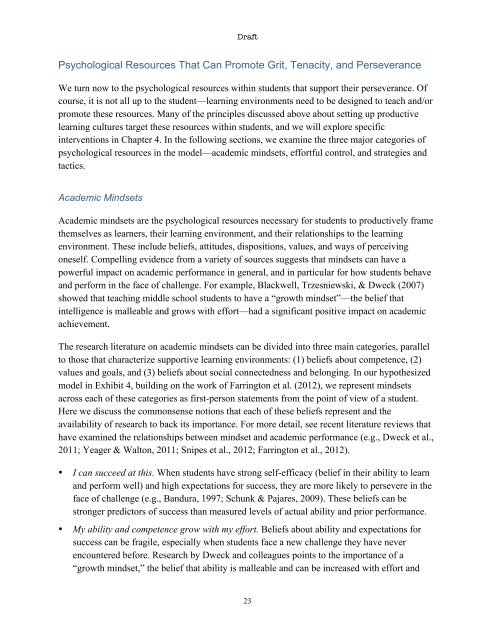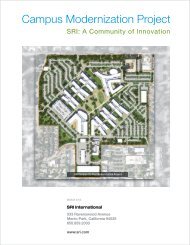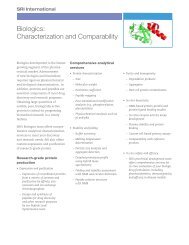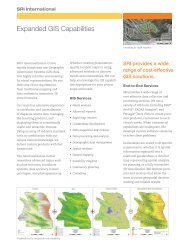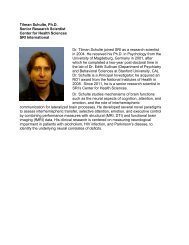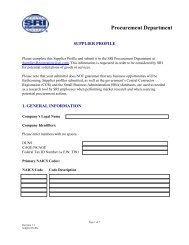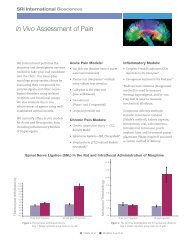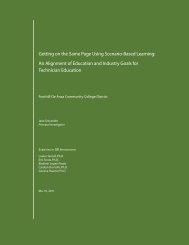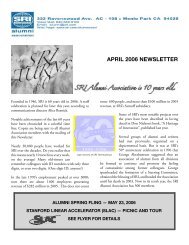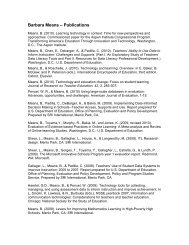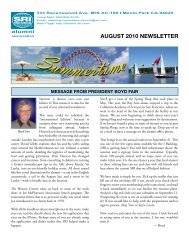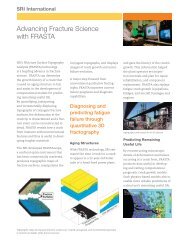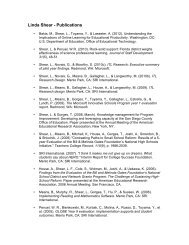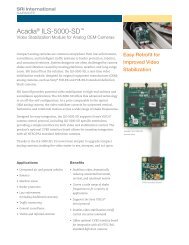Promoting Grit, Tenacity, and Perseverance - U.S. Department of ...
Promoting Grit, Tenacity, and Perseverance - U.S. Department of ...
Promoting Grit, Tenacity, and Perseverance - U.S. Department of ...
You also want an ePaper? Increase the reach of your titles
YUMPU automatically turns print PDFs into web optimized ePapers that Google loves.
Draft<br />
Psychological Resources That Can Promote <strong>Grit</strong>, <strong>Tenacity</strong>, <strong>and</strong> <strong>Perseverance</strong><br />
We turn now to the psychological resources within students that support their perseverance. Of<br />
course, it is not all up to the student—learning environments need to be designed to teach <strong>and</strong>/or<br />
promote these resources. Many <strong>of</strong> the principles discussed above about setting up productive<br />
learning cultures target these resources within students, <strong>and</strong> we will explore specific<br />
interventions in Chapter 4. In the following sections, we examine the three major categories <strong>of</strong><br />
psychological resources in the model—academic mindsets, effortful control, <strong>and</strong> strategies <strong>and</strong><br />
tactics.<br />
Academic Mindsets<br />
Academic mindsets are the psychological resources necessary for students to productively frame<br />
themselves as learners, their learning environment, <strong>and</strong> their relationships to the learning<br />
environment. These include beliefs, attitudes, dispositions, values, <strong>and</strong> ways <strong>of</strong> perceiving<br />
oneself. Compelling evidence from a variety <strong>of</strong> sources suggests that mindsets can have a<br />
powerful impact on academic performance in general, <strong>and</strong> in particular for how students behave<br />
<strong>and</strong> perform in the face <strong>of</strong> challenge. For example, Blackwell, Trzesniewski, & Dweck (2007)<br />
showed that teaching middle school students to have a “growth mindset”—the belief that<br />
intelligence is malleable <strong>and</strong> grows with effort—had a significant positive impact on academic<br />
achievement.<br />
The research literature on academic mindsets can be divided into three main categories, parallel<br />
to those that characterize supportive learning environments: (1) beliefs about competence, (2)<br />
values <strong>and</strong> goals, <strong>and</strong> (3) beliefs about social connectedness <strong>and</strong> belonging. In our hypothesized<br />
model in Exhibit 4, building on the work <strong>of</strong> Farrington et al. (2012), we represent mindsets<br />
across each <strong>of</strong> these categories as first-person statements from the point <strong>of</strong> view <strong>of</strong> a student.<br />
Here we discuss the commonsense notions that each <strong>of</strong> these beliefs represent <strong>and</strong> the<br />
availability <strong>of</strong> research to back its importance. For more detail, see recent literature reviews that<br />
have examined the relationships between mindset <strong>and</strong> academic performance (e.g., Dweck et al.,<br />
2011; Yeager & Walton, 2011; Snipes et al., 2012; Farrington et al., 2012).<br />
• I can succeed at this. When students have strong self-efficacy (belief in their ability to learn<br />
<strong>and</strong> perform well) <strong>and</strong> high expectations for success, they are more likely to persevere in the<br />
face <strong>of</strong> challenge (e.g., B<strong>and</strong>ura, 1997; Schunk & Pajares, 2009). These beliefs can be<br />
stronger predictors <strong>of</strong> success than measured levels <strong>of</strong> actual ability <strong>and</strong> prior performance.<br />
• My ability <strong>and</strong> competence grow with my effort. Beliefs about ability <strong>and</strong> expectations for<br />
success can be fragile, especially when students face a new challenge they have never<br />
encountered before. Research by Dweck <strong>and</strong> colleagues points to the importance <strong>of</strong> a<br />
“growth mindset,” the belief that ability is malleable <strong>and</strong> can be increased with effort <strong>and</strong><br />
23


